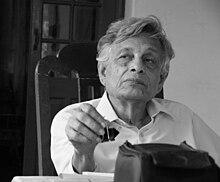Irfan Habib
| Irfan Habib | |
|---|---|

Irfan Habib – at his residence in Aligarh
|
|
| Citizenship | Indian |
| Fields | History |
| Alma mater | |
| Doctoral advisor | C.C. Davies |
| Notable awards |
Watumull Prize (1982)
Padma Bhushan (2005) |
Padma Bhushan (2005)
Irfan Habib (born 1931) is an Indian historian of ancient and medieval India, following the approach of Marxist historiography. He is well known for his strong stance against Hindu and Islamic fundamentalism. He has authored a number of books, including Agrarian System of Mughal India, 1556–1707.
Habib is the son of Mohammad Habib, an historian and Sohaila Habib (née Tyabji). His paternal grandfather was Mohammad Naseem, a wealthy barrister, and nationalist, who funded the Lucknow Session of the Indian National Congress in 1916. His maternal grandfather was Abbas Tyabji, a close associate of Mahatma Gandhi, who became the Chief Justice of the High Court of Baroda. His wife Sayera Habib (née Siddiqui) taught as Professor of Economics at Aligarh Muslim University. His second son Faiz Habib is Cartographic Assistant in Archaeological Section of Center of Advanced Study.
After he returned from Oxford he joined AMU as a member of the faculty. He was Professor of History at Aligarh from 1969–91. He is presently appointed as Professor Emeritus at the Department of History of the AMU. He delivered the Radhakrishnan Lecture at Oxford in 1991. He is an Elected Corresponding Fellow of the British Royal Historical Society since 1997.
Habib has worked on the historical geography of Ancient India, the history of Indian technology, medieval administrative and economic history, colonialism and its impact on India, and historiography.
Amiya Kumar Bagchi describes Habib as "one of the two most prominent Marxist historians of India today and at the same time, one of the greatest living historians of India between the twelfth and eighteenth centuries."
...
Wikipedia
